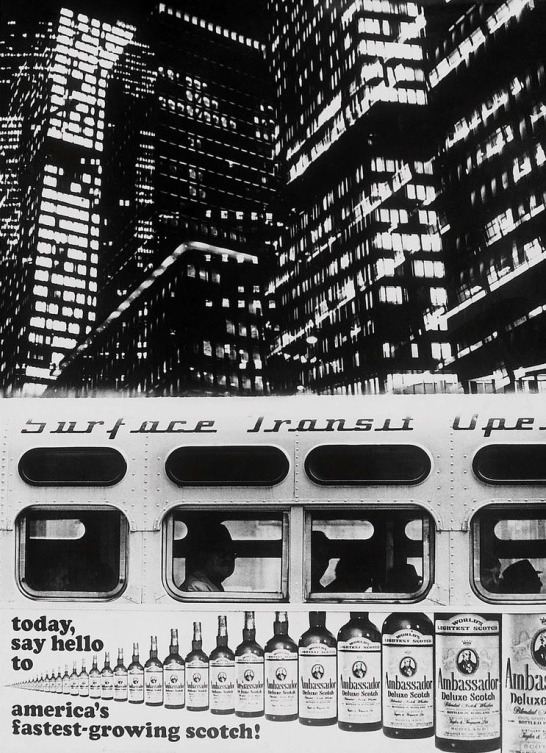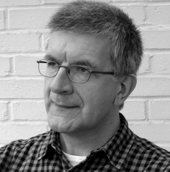
Surface Transit by Eva Fuka, 1964
In 1964, the Czech photographer Eva Fuka visited New York for two weeks. To an artist arriving from Prague—small, sad and dark, as Fuka described the city, and also Communist—New York’s gigantic buildings, burning lights and the streets pulsing with life were overwhelming. Three years later, Fuka (born in 1927) and her husband requested asylum in Germany, applied for visas, and emigrated to the U.S., where she remained until her 70s, when she repatriated to the Czech Republic.
Brief as it was, Fuka’s first stay in New York provoked a cogent photographic reaction, and Surface Transit is one of the images. The picture condenses the dislocating excitement of Manhattan into just two motifs, a night view of angled skyscrapers and the flat side of a bus, like a moving billboard, emblazoned with a Mad Men era ad for Scotch. Although the picture must be a montage, it fuses together as a single image in which the vehicle appears to glide beneath the dark towers, its black on white windows, peopled by shadowy passengers, reversing the pattern of brilliant illumination in the office windows overhead. In a similar echo, the line of whisky bottles stretching into the distance duplicates the vertical architecture of the city’s long unbending avenues.
The fruits of Fuka’s first acquaintance with New York show an obvious kinship with American Pop Art of the period by artists such as Rauschenberg, Warhol, and Lichtenstein. The pictures in William Klein’s photobook Life is Good & Good for You in New York (1956) smash together graphically with the same relentless energy. It is unlikely that Fuka had seen these artists at that point. “I was not influenced by anyone, nor did it occur to me to try out someone else’s technique,” she says in a monograph published in 2007. She reached her visual conclusions through force of intuition.
Fuka established herself as a photographer at a time when men dominated the field in Czechoslovakia. Now that she has been restored to Czech photographic history—émigrés were struck from the record in the Communist years—she is celebrated as a pioneer. She had her first exhibition in Prague in 1961, and two years later, she was the first woman in the country to be the subject of a photographic monograph. In the American pictures, the subdued “Poetism” and Surrealism of Fuka’s stylistically varied early work collided head on with the superabundance and hyperbole of commerce, mass media, advertising slogans, comic books and signs in the street, and the experience proved to be a turning point.


Comments [2]
04.28.15
06:40
05.04.15
06:04